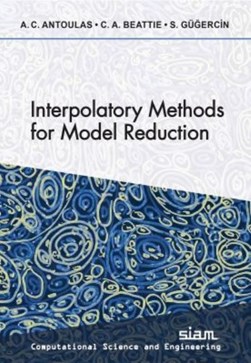-
BROWSE 1000s OF BOOKS IN STOCK
-
FREE DELIVERY ON ORDERS OVER €10
Interpolatory methods for model reduction
PAPERBACK
Series: See all books in this series
Dynamical systems are a principal tool in the modeling, prediction, and control of a wide range of complex phenomena. As the need for improved accuracy leads to larger and more complex dynamical systems, direct simulation often becomes the only available strategy for accurate prediction or control, inevitably creating a considerable burden on computational resources. This is the main context where one considers model reduction, seeking to replace large systems of coupled differential and algebraic equations that constitute high fidelity system models with substantially fewer equations that are crafted to control the loss of fidelity that order reduction may induce in the system response. Interpolatory methods are among the most widely used model reduction techniques, and Interpolatory Methods for Model Reduction is the first comprehensive analysis of this approach available in a single, extensive resource. It introduces state-of-the-art methods reflecting significant developments over the past two decades, covering both classical projection frameworks for model reduction and data-driven, nonintrusive frameworks. This textbook is appropriate for a wide audience of engineers and other scientists working in the general areas of large-scale dynamical systems and data-driven modeling of dynamics.
€117.45

352 Reward Points
In stock online
Extended Range: Delivery in 2-3 working days
Extended Range: Delivery in 2-3 working days
Free Delivery on this item
Any purchases for more than €10 are eligible for free delivery anywhere in the UK or Ireland!
Dynamical systems are a principal tool in the modeling, prediction, and control of a wide range of complex phenomena. As the need for improved accuracy leads to larger and more complex dynamical systems, direct simulation often becomes the only available strategy for accurate prediction or control, inevitably creating a considerable burden on computational resources. This is the main context where one considers model reduction, seeking to replace large systems of coupled differential and algebraic equations that constitute high fidelity system models with substantially fewer equations that are crafted to control the loss of fidelity that order reduction may induce in the system response. Interpolatory methods are among the most widely used model reduction techniques, and Interpolatory Methods for Model Reduction is the first comprehensive analysis of this approach available in a single, extensive resource. It introduces state-of-the-art methods reflecting significant developments over the past two decades, covering both classical projection frameworks for model reduction and data-driven, nonintrusive frameworks. This textbook is appropriate for a wide audience of engineers and other scientists working in the general areas of large-scale dynamical systems and data-driven modeling of dynamics.

352 Reward Points
Any purchases for more than €10 are eligible for free delivery anywhere in the UK or Ireland!
€117.45

352 Reward Points
Any purchases for more than €10 are eligible for free delivery anywhere in the UK or Ireland!
Product Description
Dynamical systems are a principal tool in the modeling, prediction, and control of a wide range of complex phenomena. As the need for improved accuracy leads to larger and more complex dynamical systems, direct simulation often becomes the only available strategy for accurate prediction or control, inevitably creating a considerable burden on computational resources. This is the main context where one considers model reduction, seeking to replace large systems of coupled differential and algebraic equations that constitute high fidelity system models with substantially fewer equations that are crafted to control the loss of fidelity that order reduction may induce in the system response. Interpolatory methods are among the most widely used model reduction techniques, and Interpolatory Methods for Model Reduction is the first comprehensive analysis of this approach available in a single, extensive resource. It introduces state-of-the-art methods reflecting significant developments over the past two decades, covering both classical projection frameworks for model reduction and data-driven, nonintrusive frameworks. This textbook is appropriate for a wide audience of engineers and other scientists working in the general areas of large-scale dynamical systems and data-driven modeling of dynamics.
Product Details
ISBN9781611976076
FormatPAPERBACK
PublisherSOCIETY FOR INDUSTRIAL AND APPLIED MATHEMATICS (28 February. 2020)
No. of Pages0
Weight530
Language English
Dimensions 179 x 256 x 21

